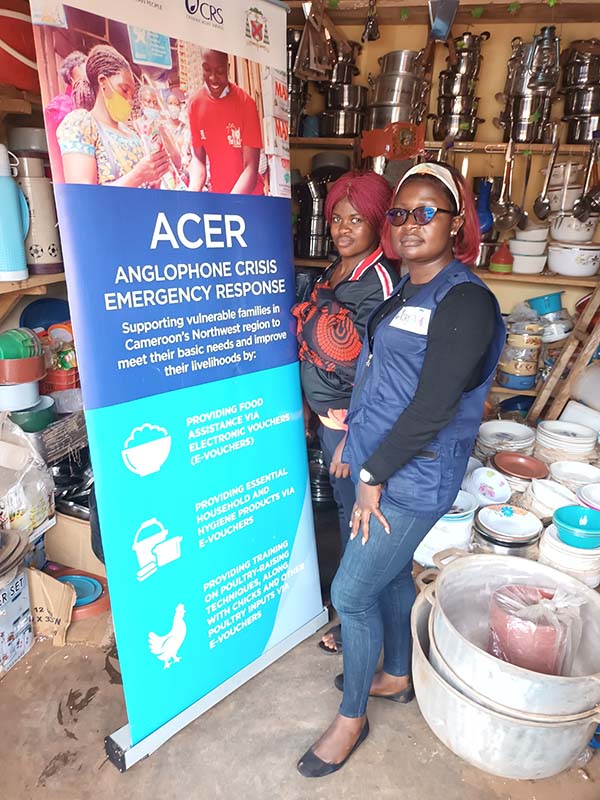
Voucher Program Boosts Cameroon Business
Martine, a shop owner in Santa, a community in the Northwest region of Cameroon, never imagined how her business could grow by partnering with a humanitarian project in her own community.
But when Catholic Relief Services staff explained to Martine that she would be able to support displaced and host families affected by the ongoing conflict and gain new customers at the same time, she jumped at the chance to become a vendor for the project. This decision paid off, helping her to better care for her two children and one other relative.

An ACER III staff member checks in with Martine, a vendor within the ACER III program, at her shop in the Santa Market in the Northwest region of Cameroon. Photo by Wanka Roland/Archdiocese of Bamenda for CRS
Before becoming a vendor in the ACER III project, Martine ran a small retail shop offering household items, such as cooking pots, serving dishes, plates and cups, with an estimated capital value of about $830, to sell in her small shop at the entrance to the Santa local market.
Santa is one of the hardest hit communities in the ongoing crisis in the English speaking Northwest and Southwest regions. The crisis began in 2016 and soon escalated into armed conflict, resulting in ongoing insecurity and causing many families to flee their homes. Regular fighting by state and non-state forces has caused significant disruption in supply chains and business growth but also presents challenges for many households to even meet their daily needs.
Once Martine was selected to be a vendor in ACER III, she started diversifying and expanding her stock of products to offer to the participants who received credit to purchase food and household items in local shops. She was one of the vendors serving the 244 ACER III participants living in Santa.
Martine has seen a variety of benefits through her engagement with the project. Most importantly, her customer base has expanded far beyond the project participants to other community members. Her daily number of customers increased from about 20 to between 30 and 40. New customers have heard about her shop from participants and sought her out to make purchases. Martine has doubled her initial capital to about $1,650, which has enabled her to rent a bigger shop that can store more stock.
“I am able to order in bulk and have sufficient stock to advertise from my shop on social media,” she shared. “My children and I are able to eat well and healthier.”
Martine has also gained new digital skills from participating as a vendor in the project, skills that can help her continue growing the business. Through the project, she received equipment training—including a mobile phone and Bluetooth printer—needed for participants to purchase goods in her shop using their electronic cards that get topped-up with credit. Once vendors sync the purchases on their mobile devices, CRS has access to real-time sales data and uses that to pay vendors for purchases. Martine has also used the phone to stay in contact with customers and promote her business.
According to Martine, the electronic voucher program, in which participants receive credit on smart cards to be redeemed in vendor shops, is better than cash because it protects her from theft and keeps her safe.
“Nobody knows when I have money or not since the money for items redeemed by project participants with their e-vouchers is paid directly into my bank account by CRS,” she says.
Martine has been able to leverage this opportunity to grow her business while helping her community.
“I feel satisfied that I took the step to apply as a vendor of ACER III as this has given me the greatest business breakthrough.”
Funded by the U.S. Agency for International Development’s Bureau for Humanitarian Assistance, the Anglophone Crisis Emergency Response III project responded to the basic needs of 12,725 individuals from vulnerable Internally Displaced Persons and host families in 27 communities affected by the ongoing crisis in Cameroon’s English-speaking regions. Between April 2022 through March 2023, households received six rounds of monthly food assistance and a one-time credit to purchase household supplies. Sixty households also received training and support to launch poultry-raising businesses to help them become more self-sufficient. Over the past four years, CRS, and the Archdiocese of Bamenda have provided emergency assistance to more than 100,000 people in the Northwest thanks to funds from USAID and BHA.

